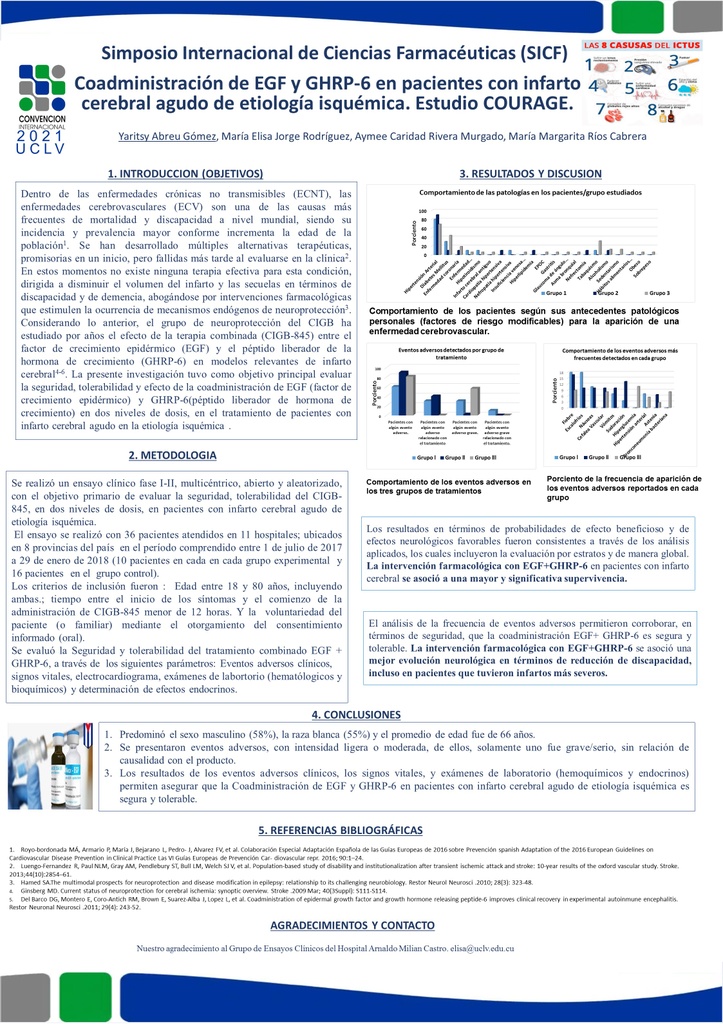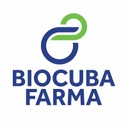Executive Secretary

Simposio Internacional de Ciencias Farmaceúticas
SICF

Abstract
The main objective of the present investigation was to evaluate the safety, tolerability and effect of the co-administration of EGF (epidermal growth factor) and GHRP-6 (growth hormone releasing peptide) at two dose levels, in the treatment of patients with Acute cerebral infarction in ischemic etiology. During the investigation, the safety and tolerability of the combination was determined through clinical adverse events, vital signs, and laboratory tests. The effect of co-administration in acute cerebral infarction was evaluated in terms of the reduction in capacity measured by the Rankin scale and death at discharge and 3 and 6 months after treatment, and the effect of co-administration was evaluated at the level of neurological deficit mediated by the NIHSS scale and in the ability to perform activities according to the Barthel index, at discharge and at 3 and 6 months post-treatment. The study covered the period from July 2017 to January 2018. The analysis of the frequency of adverse events allowed to corroborate, in terms of safety, that the co-administration of EGF + GHRP-6 is safe and tolerable. The pharmacological intervention with EGF + GHRP-6 was associated with a better neurological outcome in terms of disability reduction in patients who had more severe heart attacks. The results in terms of probabilities of beneficial effect and favorable neurological effects were consistent across all applied analyzes, which included evaluation by strata and globally. The Pharmacological intervention with EGF + GHRP-6 in patients with cerebral infarction was associated with a longer and significant survival.
Resumen
La presente investigación tuvo como objetivo principal evaluar la seguridad, tolerabilidad y efecto de la coadministración de EGF (factor de crecimiento epidérmico) y GHRP-6(péptido liberador de hormona de crecimiento) en dos niveles de dosis, en el tratamiento de pacientes con infarto cerebral agudo en la etiología isquémica. Durante la investigación se determinó la seguridad y la tolerabilidad de la combinación a través de los eventos adversos clínicos, signos vitales, y exámenes de laboratorio; se evaluó el efecto de la coadministración en el infarto cerebral agudo, en cuanto a la reducción de la capacidad medida por la escala Rankin y se evaluó el efecto de coadministración en el nivel de déficit neurológico mediado por la escala NIHSS y por la capacidad de realizar actividades según el índice de Barthel, al egreso y a los 3 y 6 meses post-tratamiento. El estudio abarcó el periodo de julio 2017 a enero 2018. El análisis de la frecuencia de eventos adversos permitieron corroborar, en términos de seguridad, que la coadministración EGF+ GHRP-6 es segura y tolerable. La intervención farmacológica con EGF+GHRP-6 se asoció una mejor evolución neurológica en términos de reducción de discapacidad, incluso en pacientes que tuvieron infartos más severos. Los resultados en términos de probabilidades de efecto beneficioso y de efectos neurológicos favorables fueron consistentes a través de los análisis aplicados, los cuales incluyeron la evaluación por estratos y de manera global. La intervención farmacológica con EGF+GHRP-6 en pacientes con infarto cerebral se asoció a una mayor y significativa supervivencia.
About The Speaker

Dra. María Elisa Jorge Rodríguez

